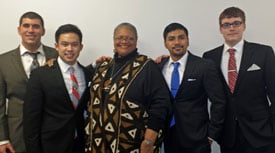 |
|
| Members of the 2013-14 Health Science Preparation Program with program director Deborah Harmon Hines, PhD, are, from left, Charles Nessralla, Jonathan Quang, Steven Em and Brandon Smith. |
As refugees from Vietnam, Jonathan Quang’s parents faced many hardships. But even as they struggled to survive, they instilled in their son the value of education.
“My parents had very deprived childhoods, devoid of an education and filled with starvation. Despite this, my father tells me that he would often trade his meals for guitar lessons,” said Quang. “I think that their life of lack has always been an inspiration for me to appreciate and pursue an education.”
Thanks to the year-long Health Sciences Preparation Program (HSPP), Quang will be taking the next step in his educational journey as a member of the School of Medicine Class of 2018. He was one of four participants in the 2013-14 HSPP, a potential pathway to admission for disadvantaged and/or underrepresented students who are preparing for medical school. All four students were admitted to UMMS, an achievement particularly notable given that only 10.5 percent of a record number of 1,188 applicants were accepted.
The goals of the HSPP are to enhance student diversity and boost the educational preparedness of students for participation in the SOM curriculum. Participants are invited into the HSPP based on a strong prior application that indicated extra mentoring and academic preparation might enhance future potential. Upon completion of HSPP, they are not assured admission and must reapply like other applicants.
“The HSPP seeks to strengthen the applications of students from groups underrepresented in medicine in Massachusetts or from disadvantaged backgrounds, helping to make the SOM student body more reflective of the population of the commonwealth. It is very gratifying to watch these students grow personally and professionally,” said Deborah Harmon Hines, PhD, professor of cell & developmental biology and vice provost for school services, who oversees the program.
The HSPP, now in its second year, is a remodeled version of the UMMS Post-Baccalaureate Program (PBP) that operated from 1998 to 2010. The major difference between the two programs is the introduction of formal courses in epidemiology, biostatistics and clinical medicine as well as an applied research component, all of which reflect key elements of the SOM’s new Learner-Centered Integrated Curriculum.
“The HSPP not only helped me in applying for medical school, it prepared me to succeed in medical school. By fully immersing me in the medical school classes and providing a wealth of support and guidance from experienced staff, I was able to gain all the necessary skills and work ethic to succeed,” said Quang, who added that one of the best parts of the program was the small size. “We learned to work as a team and provided support for each other whenever it was needed. This sense of camaraderie was a critical component to our success in the program.”
Quang, as a student at Worcester North High School, participated in the Worcester Pipeline Collaborative (WPC), which brought him into the lab of Stephen J. Doxsey, PhD, professor of molecular medicine, biochemistry & molecular pharmacology and cell & developmental biology, and Craig C. Mello, PhD, Howard Hughes Medical Institute Investigator, the Blais University Chair in Molecular Medicine and distinguished professor of molecular medicine and cell & developmental biology. Through the WPC, he also attended the National Youth Leadership Forum in Medicine.
Participants in the HSPP must undertake six credits of core curriculum and six credits of professional development activities in both fall and spring semesters.
“UMass Medical School recognizes that in the commonwealth we have a population of students underrepresented in medicine who have the ability to be successful in our medical school and as physicians who will benefit from a limited amount of additional training not only in the sciences but in professional development,” said Melissa Fischer, MD, MEd, associate professor of medicine and associate dean for undergraduate medical education. “We have a strong commitment to diversity in the SOM, and programs like this help us to demonstrate and achieve that.”
An analysis of outcomes of the original post-baccalaureate program showed that 66 percent of participants were admitted to UMMS, and of those, 16 are now primary care physicians, eight specialize in surgery or anesthesiology and six have faculty appointments.